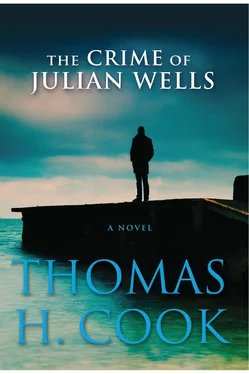Thomas Cook - The Crime of Julian Wells
Здесь есть возможность читать онлайн «Thomas Cook - The Crime of Julian Wells» весь текст электронной книги совершенно бесплатно (целиком полную версию без сокращений). В некоторых случаях можно слушать аудио, скачать через торрент в формате fb2 и присутствует краткое содержание. Год выпуска: 2012, ISBN: 2012, Издательство: Grove Press, Жанр: Криминальный детектив, на английском языке. Описание произведения, (предисловие) а так же отзывы посетителей доступны на портале библиотеки ЛибКат.
- Название:The Crime of Julian Wells
- Автор:
- Издательство:Grove Press
- Жанр:
- Год:2012
- ISBN:9780802194589
- Рейтинг книги:5 / 5. Голосов: 1
-
Избранное:Добавить в избранное
- Отзывы:
-
Ваша оценка:
- 100
- 1
- 2
- 3
- 4
- 5
The Crime of Julian Wells: краткое содержание, описание и аннотация
Предлагаем к чтению аннотацию, описание, краткое содержание или предисловие (зависит от того, что написал сам автор книги «The Crime of Julian Wells»). Если вы не нашли необходимую информацию о книге — напишите в комментариях, мы постараемся отыскать её.
The Crime of Julian Wells — читать онлайн бесплатно полную книгу (весь текст) целиком
Ниже представлен текст книги, разбитый по страницам. Система сохранения места последней прочитанной страницы, позволяет с удобством читать онлайн бесплатно книгу «The Crime of Julian Wells», без необходимости каждый раз заново искать на чём Вы остановились. Поставьте закладку, и сможете в любой момент перейти на страницу, на которой закончили чтение.
Интервал:
Закладка:
“Did Harry give you Julian’s latest?” she asked as she took a seat across from me.
“No, but he’s sending it to me.”
Loretta lifted her glass. “Well, to Julian’s last book,” she said.
A thought occurred to me. “Do you have the map?” I asked. “The one Julian was looking at before he died?”
“Of course,” Loretta said.
“May I see it?”
She gave me a quizzical look, then got to her feet, walked over to a nearby table, and drew the map from one of its drawers.
“Argentina, like I said,” she said, handing it to me.
I took the map from her and unfolded it.
“What are you looking for?” Loretta asked.
“I’m not sure,” I admitted.
I did not have to be Sherlock Holmes to see that Julian had focused his attention quite narrowly on a small area of Argentina, the sparsely populated region tucked near the conjoining borders of Paraguay and Brazil, very near the great falls at Iguazu. In pencil, he’d traced a route from the falls to the small village of Clara Vista, which he’d circled, and which lay just across the Paraguayan border. It was a town I’d never heard of and we hadn’t visited it during our trip to Argentina.
“He may simply have been reminiscing,” Loretta said. “It wasn’t all bad, his time in Argentina. He always described Buenos Aires as quite beautiful. And, of course, there was that guide who so impressed him.”
I glanced up from the map and for the first time in many years, said her name.
“Marisol.”
Loretta nodded softly. “By the way, I called Rene today,” she said.
She meant Rene Brossard, who had served in one way or another as Julian’s assistant, first as his French interpreter, then by means of small tasks, collecting his mail and paying the bills on the apartment in Paris during the long periods when Julian was away.
“I’d already told him about Julian, of course,” Loretta said. “But today I told him that I wanted him to have something of Julian’s. Just a little token. His pen.”
“I’m sure Rene will appreciate that.”
“And I have something for you,” Loretta said.
With that, she rose and left the room. I heard her footsteps as she made her way up the stairs to the little room that had been Julian’s office.
She came back down the stairs a few minutes later, carrying an old leather briefcase.
“It was Julian’s one true traveling companion,” she said as she handed it to me. “It went all over the world with him.”
The briefcase was old and discolored, its seams frayed here and there, and it gave off a powerful sense of Julian’s life, how he’d lived it like a man on the run.
“Thank you, Loretta,” I said as I took it from her. “I will treasure it, believe me.”
Later, back at my apartment, I put Julian’s briefcase beside my reading chair, then picked up The Tortures of Cuenca, determined, perhaps as a final act of homage to my best friend’s life and work, to finish it before going to bed.
Under torture, Valero and Sanchez had confessed to killing Jose Grimaldos and destroying his body. Oddly, they’d been unable to designate where his body lay, a fact, as Julian noted, that should have called their confessions into question, but which, in a strange reversal, had served instead as further evidence of their guilt:
Valero and Sanchez had refused to locate the body because the death of Grimaldos had been long and terrible, so the town believed. They had refused because, once unearthed, Grimaldos’s body would reveal what had been inflicted upon it while poor, bullied El Cepa had still lived: a body beaten, slashed, burned, with eyes plucked out and ears cut off, with knees bashed and fingers severed, and every shy;where, everywhere, sliced-away flaps of skin. So runs the imagination, as greater guilt is made certain by the uncertainty of the evidence. By this means, the lack of a body merely deepened the crime of Cuenca, multiplied its offense, and made Grimaldos’s murder yet more cruel, sprouting new snakes from Medusa’s head.
For these many crimes, the prosecuting attorney asked for the death penalty, but the case dragged on through the labyrinthine chambers of the Spanish judicial system, until, in 1918, the accused were at last sentenced, each to eighteen years.
They were released six years later, and two years after that, in the spring of 1926, as Julian wrote, “poor, bullied El Cepa, so long assumed hideously murdered, suddenly appeared.”
He had been living in a nearby village all those many years, and in the final passage of his book, Julian takes his readers from the eagle-eye roost of the Casas Colgadas, over the twining river and scrub brush and the bare rocks of the plain, then eastward, toward the coast, along the shabby roads of rural Spain, on and on, until he brings them to the flowered streets of Valencia and at last into the shadowy interior of a small kiosk, where. .
. . during the last years of his life, El Cepa, the unmurdered, toiled in his tiny, suffocating space, remembering or not the dusty streets of Cuenca, and selling lottery tickets for life’s least deadly game of chance. And thus did he remain, El Cepa, still undead, but locked in the casket of his booth, and with each hot breath, struggling in that darkness to outlive his crime.
I closed the book and recalled that when I’d first read it all those many years ago, I’d found nothing particularly striking in that final passage. For that reason it seemed strange to me that these same stark words now quite inexplicably moved me. For here was Julian’s sense of life’s cruel randomness, life a lottery upon whose uncontrollable outcome everything depended, how because this streetcar stopped on this particular corner at this particular moment, nothing for this particular human being would ever be the same.
But was this all that was to be found at the end of Julian’s first book?
I considered all the books and articles that had followed The Tortures of Cuenca, a life’s work whose dark subject matter I had always laid at the foot of some mental oddity little different from the obsession of stamp collectors or people who grow orchids.
Loretta had once said that Julian’s books always ended like the tolling of a bell. But had that really been his concluding mood? Or was it rather, as it seemed at the end of The Tortures of Cuenca, a sense of life as a grim trickster whose cruel twists and turns none of us can avoid.
I closed the book, then, on impulse opened it again, this time to the dedication Julian had written so many years before: For Philip, sole witness to my crime . I had always thought this entirely tongue-in-cheek. But now, given the life that had subsequently come to my friend, and the terrible way by which he’d ended it, I couldn’t help but wonder if this strange dedication, haunting as it seemed to me now, pointed to some different, darker, and perhaps still-unsolved crime.
I recalled the final passage once again, my mind now focused on its concluding line: to outlive his crime.
In the book’s dedication I’d been singled out as the sole witness to Julian’s crime, but I could think of no such offense, no crime I’d ever witnessed. But had there been one that I hadn’t recognized or discovered, a crime that Julian, too, had struggled to outlive but failed?
Part II
6
”I can’t stop thinking about Julian,” I told Loretta.
She’d come into the city as she always did on the anniversary of her son’s death. He’d loved Central Park, and during the earlier stages of his illness, before he’d been confined to a wheelchair, they’d sometimes come here to sit and watch passersby, and even from time to time, when he’d still been able to do it, to stroll around the pond, as Loretta and I were now doing.
Читать дальшеИнтервал:
Закладка:
Похожие книги на «The Crime of Julian Wells»
Представляем Вашему вниманию похожие книги на «The Crime of Julian Wells» списком для выбора. Мы отобрали схожую по названию и смыслу литературу в надежде предоставить читателям больше вариантов отыскать новые, интересные, ещё непрочитанные произведения.
Обсуждение, отзывы о книге «The Crime of Julian Wells» и просто собственные мнения читателей. Оставьте ваши комментарии, напишите, что Вы думаете о произведении, его смысле или главных героях. Укажите что конкретно понравилось, а что нет, и почему Вы так считаете.












